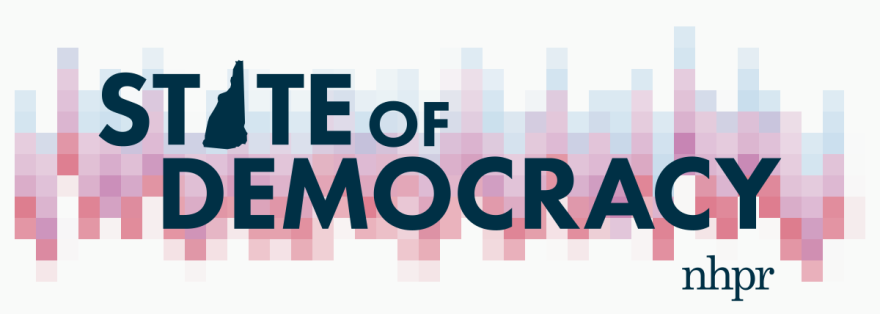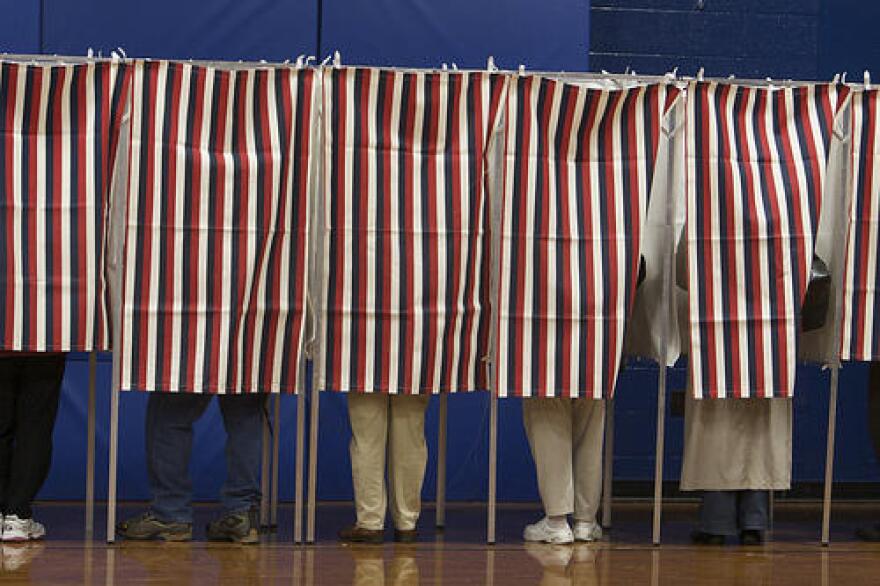There’s been a lot of talk in the past year about the need to pass stricter voting laws and clean up New Hampshire’s elections. But there’s been a lot less talk about any specific cases of voter fraud. NHPR’s Casey McDermott wanted to find out more about what the issue actually looks like.
(Scroll down for a full interactive on the state's voter fraud files.)
Take a minute and picture the scene that usually comes to mind whenever someone talks about voter fraud in New Hampshire. Probably something like this, right?
“Based on what I’ve seen with my own eyes, busloads of people coming in, whether they’re illegal — meaning they came into the country illegally — or they’re illegal voters that came over from Massachusetts into New Hampshire..."
That was Gilford resident Billy Baer speaking on a CNN panel a year ago about voter fraud. At the time, Baer was repeating a claim put forward by President Trump and some of his top aides — that literal busloads of non-residents help to decide New Hampshire elections.

When pressed, Baer later said he could not actually cite where he saw those “busloads,” except on television. Likewise, many of the staunchest advocates for stricter voting laws in New Hampshire will usually concede that they’ve never personally witnessed widespread fraud.
But at the same time, the very idea that lots of people out there are questioning the integrity of New Hampshire’s elections has been used to justify major changes to the state’s voting laws over the last year.
Sen. Regina Birdsell, who sponsored a hotly debated bill to tighten voter eligibility known as Senate Bill 3, said the legislation wasn’t necessarily meant to address specific instances of voter fraud. Rather, as she told NHPR’s The Exchange last year, it was driven largely by concerns from constituents about a perceived problem with the status quo:
"Right or wrong, there is a perception out there that there are issues with our election integrity."
Other politicians have also echoed similar sentiments when talking about election policy, including Sen. Andy Sanborn, here during a more recent debate on another bill to tighten voting eligibility:
"The Secretary of State himself has said we have a trust issue in our state. And we need to fix that."
And Gov. Chris Sununu, during a news conference earlier this year addressing legislative priorities:
“If you look at the polls, I think everyone has a serious concern about voter fraud in New Hampshire. I think something like a third of Granite Staters said it was a serious problem. You want to make sure our system has integrity. That’s why Senate Bill 3 was such a powerful bill last year.”
Along the way, politicians pushing for tighter voting laws have taken cues from the man who’s been in charge of New Hampshire’s elections since 1976: Secretary of State Bill Gardner.
In the last four decades, Gardner’s overseen hundreds of close recounts and high-profile races, up and down the ballot. So when it comes to New Hampshire elections, his word is usually taken as gospel.
Now, Gardner’s been clear about the fact that he doesn’t have any evidence to show that buses are coming across the border on Election Day. Asked to address those rumors at a State House hearing on Senate Bill 3 last year, he replied, “We’ve never been provided proof, but a number of people in this state believe there is something like that happening.”
But he’s also been adamant that there is plenty of other evidence to warrant stricter voting rules.
“We’ve had a prosecuted case in every single general election, going back a dozen years,” Gardner told lawmakers at one State House hearing on Senate Bill 3 last year. “Including [the 2016 election], already, and there will probably be more to come.”
At another public hearing on the same bill, Gardner repeated the claim but went even further, saying there’s been at least one voter fraud conviction in every statewide election going back to 1998.
“When I said prosecution, I meant conviction,” Gardner emphasized. “I would not talk about something that did not have an end result.”
Not long after Gardner made those statements, I asked him if I could see the cases he was talking about. With all of the talk about people’s perceptions of voting fraud in New Hampshire, I wanted to know more about what kind of incidents had actually been documented.
In response, Gardner readily shared his references in the form of a stack of file folders that were filled with news clippings, letters to people who’d been accused of fraud and reports filed to the Legislature. But when I read through those files more closely, there were big gaps — and the records didn’t prove the point Gardner seemed to be trying to make.
For instance, the files didn’t actually include any incidents of voter fraud from 2002 or 2006. The only incident listed from 2010 was a man who voted twice in town elections — and while he was penalized, investigators said he might have cast two ballots simply because he was confused about where he was supposed to vote.
Since then, I’ve learned that part of the reason the Secretary of State’s voter fraud docket was incomplete is that no one in state government — not even the attorney general’s office, which is actually in charge of investigating complaints into suspected voter fraud — maintained such a case file until a few months ago.
The state’s election enforcement operations have languished in recent years due to a lack of funding, but an infusion of new money from the Legislature in 2016 has helped to pick up the pace.
“We've recently started to compile a lot of the documentation on this,” said Assistant Attorney General Matt Broadhead, a lead election attorney with the Department of Justice. He's been working to catch up on a backlog of hundreds of open cases not just for voter fraud, but also for things like lobbying or lawn sign violations.
“What I've been able to discover so far is that we've had about 76 complaints of wrongful voting [as defined under state statute] within the last 10 years,” Broadhead explained. “And we've had taken law enforcement action on about 10.”
The takeaway from those files, which Broadhead shared with NHPR: The reality of voter fraud in New Hampshire is a lot more nuanced than what you usually hear from politicians at the State House or pundits on TV.
Take the 2016 presidential election, for example. While the state hasn’t turned up any evidence of buses, it has punished four people for illegal voting.

The first wrongful voting prosecution from the 2016 general election went to a 71-year-old woman from Pelham who sent in an absentee ballot for her husband — just days after he passed away. State prosecutors went easy on her, considering the circumstances, and issued only a $500 fine, a fraction of what might usually be imposed.
The second case involved a man who, apparently, has been voting for several years in both Hampton and Salem. He told investigators he owns property in each town and thought he was entitled to the extra vote for local offices. He has since been informed that this is, in fact, illegal.
Then, just last week, the state sent cease and desist letters to two more people who have long participated in Dixville Notch’s world famous midnight voting tradition. Neither of them, it turns out, actually lives there anymore: One is a former employee of the Balsams Resort who moved away after it closed; the other left in 1999 and appears to now split time between various properties in northern New Hampshire and Martha’s Vineyard. Both said they kept voting in Dixville Notch because they hoped to one day return.
And while a lot of focus in the public debate around New Hampshire’s voter laws comes back to preventing out-of-staters from voting, those kind of cases prove to be the exception — not the rule. In the last 10 years, it looks like New Hampshire has only convicted one non-resident for voting here illegally. There have been a few other cases where it looked like a non-resident might have voted here, but none of those ended in prosecutions.
As for the complaints that didn’t end in penalties?
“About half of them turned out to be not founded,” Broadhead said. “And that could be because of a clerical error or a mistake that was made, or there are people who do have the same name.”
In fact, about two dozen people have been accused of voter fraud and then told they didn’t actually do anything wrong, and a pollworker likely just crossed off the wrong name by mistake. One such file reads: “Appears little old lady checked off the son instead of the father. CLOSED.”

A few other cases just looked like honest mistakes, like when a Southern New Hampshire University student voted in the wrong town because of bad advice from a pollworker. And then there were several incidents that fell into kind of a gray area: Something looked suspicious, but there wasn’t enough evidence to actually issue a penalty.
“Sometimes, even though there’s a basis for a complaint and an investigation was conducted, there just sometimes isn’t any actionable violation,” Broadhead said.
So, voter fraud does happen in New Hampshire. But — at least according to the available evidence — it is pretty rare.
After reviewing the attorney general’s files, I wanted to talk this over again with Secretary of State Bill Gardner, to get his thoughts on the gap between the conventional rhetoric on voter fraud and what the state’s files actually show.
He wasn’t exactly eager to have that conversation, but he stood by everything he’s said before — about the number of cases, but also the need to deal with a lack of confidence in the state’s elections.
Gardner also made sure to mention that his office has started working on their own voter fraud investigations. He plans to share those findings in the months ahead.
“In the end, we’ll see what we have found for facts, and present all of those facts to the people of this state," he said.
For a better experience viewing this interactive on your phone, turn it sideways








